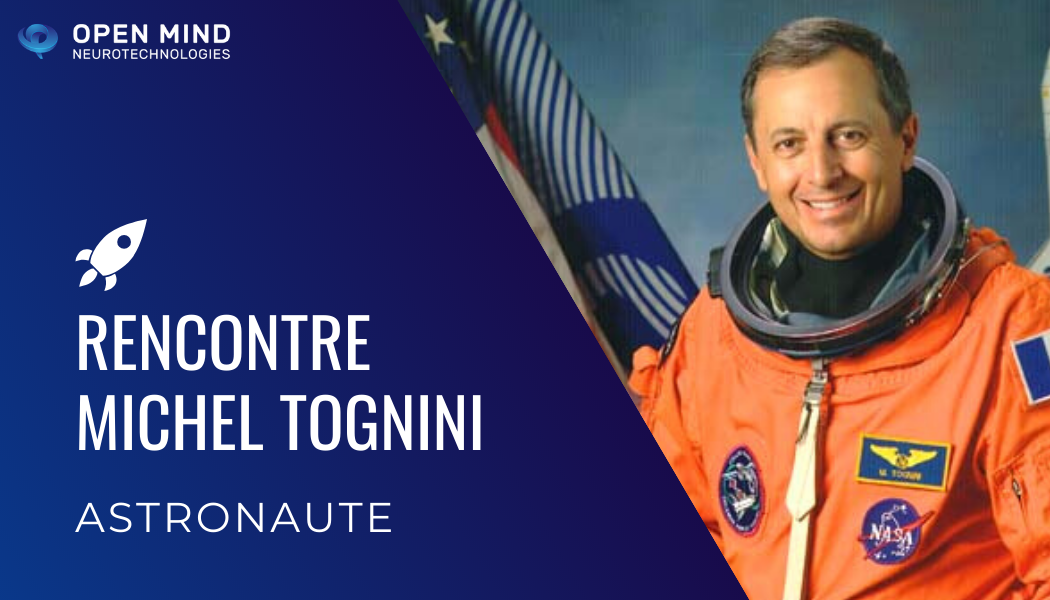Michel Tognini, astronaut, is one of 10 Frenchmen to have gone into space. After working as a fighter pilot, officer engineer and test pilot, Michel Tognini volunteered to become an astronaut. In 1986, he began training and made his first space flight in 1992, followed by a second flight in 1999 with NASA. From 2005 to 2011, Michel Tognini was Head of the European Astronaut Center (EAC).
We went to meet him (by telephone, social distancing obliges) and talked about confinement, the perception of time, man’s capacity to adapt and freedom.
In June 2010, a crew of six was confined to a space simulator. This was the Mars500 mission. Its aim was to recreate the real conditions of a round trip to Mars, to find out whether humans were psychologically and physiologically capable of enduring confinement over a long period. In all, the crew remained confined for 520 days.
Astronauts are no strangers to confinement. Every mission in space includes a time-limited confinement in a space shuttle.
“An individual who resists confinement well possesses congruence, humility, assertiveness and motivation.”
Michel Tognini
Today, when selecting members of a mission, we don’t pay as much attention to an astronaut’s purely technical abilities as we used to. What we’re really looking for today are psychological qualities, grouped into four areas that I’ve summarized under the sign CHAM. C for Congruence. This is alignment: I think, I say, I do. H for Humility, missions are complicated, we need to be able to recognize our mistakes in order to adjust our behavior and act to repair the error. A for Assertiveness. This is fundamental. When confined to a small group of people for any length of time, we must be neither aggressive nor passive. And finally, M for Motivation. Internal motivation is important.
An individual who resists confinement well possesses congruence, humility, assertiveness and motivation.
“It’s important to recognize and talk about your stressors.
You have to accept these dips in morale, not deny them […] We’re not supermen. “
Michel Tognini
To survive in confinement, you need to stay connected and have daily exchanges with your loved ones. When we’re in space, we still have an important connection with the ground, even if it’s delayed.
Secondly, it’s important to recognize and talk about your stress factors. You have to accept these moments of low morale, not deny them. It’s normal to have moments of weakness; we’re not supermen. It’s congruent to admit to yourself when things aren’t going well, and then talk to others about it. It’s also important to get a good night’s sleep, because sleep is an important moment of recuperation that takes away stress. On a mission, an astronaut sleeps around 8 hours a night. Then you need to be able to relax at home: watch films, read… I love music: playing an instrument, singing, or simply listening to music. If some people have a small garden or vegetable patch, it’s good to grow your own plants. Developing things yourself is psychologically very pleasurable. And last but not least, plan for the future: what’s the best thing you can do next, do things you haven’t managed to do before, bring yourself up to date.
For our astronauts on long confinement missions, psychological support is essential. We give them psychological support before, during and above all after the mission, because these are very confusing missions.
“With confinement, the notion of time quickly becomes blurred […]. Breaking down your day into different phases helps you manage the uncertainty of the situation”.
Michel Tognini
With confinement, the notion of time quickly becomes blurred. Yet it’s important to structure your time properly. When we’re in space, we circle the earth in 90 minutes. In one day, we live 16 days. We therefore set ourselves a very regular rhythm from Monday to Friday evening, so as not to get disoriented. In space, our working time is divided into 1/3 scientific experiments, 1/3 maintenance, repairing the station and finally 1/3 taking care of ourselves, eating, washing, exercising and looking after ourselves. We have to plan our days precisely, while remaining flexible when something unexpected happens.
Breaking down your day into different phases helps you deal with the uncertainty of the situation. What I personally do is make lists of priorities that I update every evening for the following day, and try to stick to them.
If you’re having trouble achieving what you set out to do, what I do is try to set myself simple, achievable goals. For example, at one point I couldn’t concentrate on reading much. Well, I’d set myself a goal for the day of reading one page, then the next day, read two pages. I’d stay at that level for a few days and then increase it again. And the same goes for tidying up your house, your papers, sorting your emails, etc. The simpler the daily goals, the easier they are to achieve, and the more rewarding it is.
“Today, this pandemic confronts us all with a common goal: survive with just our brains and our ability to adapt.”
Michel Tognini
I’ve found that people cope better with confinement than I thought they would. Human beings of all ages adapt.
Spaceflight alters gravity and completely changes the human organism: organs change shape, the vascular system changes, the brain changes, and we evolve with a new way of life: that of floating. And yet, astronauts learn and adapt.
Today, in confinement, we have to adapt to a new way of life, and this learning process is positive because it takes us out of our conventional environment. It takes us out of “the box”, and makes us think differently. Learning new things is good for people.
Every human being has the potential to adapt to anything. People of all ages are constantly adapting, and this applies to everyone.
Today, in this confinement, there are no longer rich and poor, we’re all confined to our homes. This pandemic confronts us all with a common goal: to survive using only our brains and our ability to adapt.
“Human beings say they need space and nature to thrive and travel. He’s wrong. This freedom is mostly mental.”
Michel Tognini
A few years ago, I gave a talk in a prison in Toulouse, to prisoners with sentences ranging from 10 to 20 years. They were locked up, and I, a pilot and astronaut, represented freedom. We were completely out of touch with our real lives. I was trying to communicate to them that escape and well-being are mainly played out in their heads.
I taught them about the planets, space and the stars, because getting out of our terrestrial environment makes us grow, even if we’re in prison. We think that human beings need space and nature to blossom and travel, but this freedom is mostly mental.
Next month, we’ll be talking to Michel Tognini about the mental preparation astronauts need to endure high levels of stress. In 2003, Michel Tognini developed the Human Behaviour and Performance training cycle, which astronauts undergo every year during their preparation for space flight.
| Summary Recognizing and talking about stress factors Structuring your day: work, home maintenance, taking care of yourself Don’t neglect your sleep by staying up too late. 8 hours a night Cultivating mental freedom Don’t forget that our ability to adapt is limitless |
Author: Anaïs Roux

